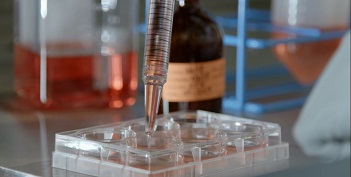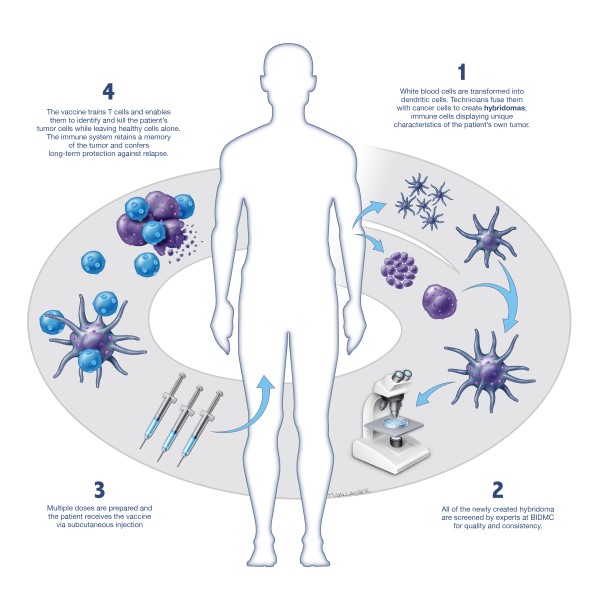A Rapidly Advancing Field that is Saving Lives
 Unlike chemotherapy and radiation, which kill cancer cells indiscriminately, immunotherapy acts on the patient’s own immune cells to help them selectively attack the cancer.
Unlike chemotherapy and radiation, which kill cancer cells indiscriminately, immunotherapy acts on the patient’s own immune cells to help them selectively attack the cancer.
BIDMC Cancer Center physician-scientists have been national leaders in the development of two types of immunotherapy: cancer vaccines and checkpoint blockades. In addition, BIDMC is a leading center of clinical research for CAR T-cell therapy and enhancing bone marrow transplant, a treatment method that is sometimes called "the original immunotherapy."
Both already-approved and experimental immunotherapy treatments are available at BIDMC for most types of solid tumors and blood cancers. Your doctor may recommend that they be used alone or in combination with chemotherapy or other immune therapies. He or she will determine whether immunotherapy is the right treatment for you.
Types of Immunotherapy Treatments
Immune Checkpoint Blockades
These drugs interfere with the ability of cancer cells to shut down the immune system. This frees T-cells—white blood cells that play a role in immunity—to attack the tumor. BIDMC was involved in all phases of the development and testing of these drugs, which are now used to treat kidney and bladder cancers, head and neck cancers, advanced melanoma, Hodgkin's lymphoma and non-small cell lung cancer. Examples are pembrolizumab, nivolumab, atezolizumab, avelumab, durvalumab and ipilimumab.
Cytokine-Based Immunotherapies
This type of immunotherapy stimulates effector T-cell responses and can be effective in fighting certain cancers like melanoma and kidney cancer. Examples are interferons, interleukins and hematopoietic growth factors.
Therapeutic Cancer Vaccines
These vaccines prompt the immune system to attack cancer by presenting it with some piece of the cancer. "Personalized" cell vaccines involve removing immune cells from the blood, re-engineering them so that they turn into special immune cells called dendritic cells and injecting them back into the bloodstream, where the aim is to cause an immune response to cancer cells. Recently published by BIDMC researchers, this approach was shown to be highly effective in preventing relapse of acute myeloid leukemia and doubling the patients achieving complete remission in myeloma. Based on these exciting findings, BIDMC is leading national studies to study the effectiveness of the vaccine. In a first of its kind study, BIDMC has trained investigators from 17 cancer centers throughout the country in vaccine production and is providing central monitoring for the study.

Chimeric Antigen Receptor (CAR) T-Cell Therapy
This therapy involves removing immune cells from the body, genetically altering them, and then returning them to the patient. The FDA has approved this "living drug" approach to treating acute lymphoblastic leukemia (ALL) in children and to advanced lymphomas and acute lymphocytic leukemia in adults. CAR T-cells have been highly effective in treating patients with recurring acute lymphoid leukemia. Trials at BIDMC are now underway to determine the effectiveness of this strategy for patients with multiple myeloma.
Bone Marrow Transplant
This treatment is a procedure that replaces unhealthy bone marrow with healthy marrow stem cells, either from the patient or from someone who is a good match. When donor cells are used, the cells develop a new immune system that recognizes and destroys cancer. Bone marrow transplant treatment is highly individualized and disease-specific, depending on the type of blood cancer you have, how advanced it is, and your own personal medical condition and your response to therapy.
 Unlike chemotherapy and radiation, which kill cancer cells indiscriminately, immunotherapy acts on the patient’s own immune cells to help them selectively attack the cancer.
Unlike chemotherapy and radiation, which kill cancer cells indiscriminately, immunotherapy acts on the patient’s own immune cells to help them selectively attack the cancer.
